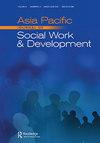Effects of group identification and stigma resistance on affiliate stigma and empowerment among families of people with mental illness
IF 1
4区 社会学
Q3 SOCIAL WORK
Asia Pacific Journal of Social Work and Development
Pub Date : 2023-09-27
DOI:10.1080/02185385.2023.2263740
引用次数: 0
Abstract
ABSTRACTTo explore effective overcoming strategies for the social stigma experienced by families of persons with mental illness (PWMI), this study examined the impact of group identification on affiliate stigma and empowerment, mediated by stigma resistance. The participants comprised 227 family members of PWMI who utilised services provided by community-based organisations in Korea. The finding of the study showed that sociodemographic factors, particularly education level, had a significant impact on empowerment. In addition, group identification was positively associated with stigma resistance. Furthermore, higher stigma resistance was associated with significantly lower levels of affiliate stigma and higher levels of empowerment. Moreover, group identification significantly indirectly affects affiliate stigma and empowerment by stigma resistance. These findings highlight the importance of social bonds and support in combating stigma, suggesting that active engagement in group-based advocacy and support groups can enhance empowerment for families of PWMI.KEYWORDS: Affiliate stigmastigma resistancegroup identificationempowermentthe family of people with mental illness Disclosure statementNo potential conflict of interest was reported by the author(s).Additional informationFundingThe work was supported by the Ministry of Education of the Republic of Korea and the National Research Foundation of Korea [NRF-2021S1A5A2A03061931].Notes on contributorsMikyung SeoMiKyung Seo, Professor, She is a Professor in the Department of Social Welfare at Gyeongsang National University, Jinju, Republic of Korea. She also serves as a Director of the Institute for Human Rights and Social Development. She focused on paratical and research in the field of mental health social work for a long time. Her research interests include human rights of mental illness and social stigma.Minhwa LeeMinHwa Lee, Assistant Professor, She is a Professor in the Department of Social Welfare at Mokpo National University, Muan, Republic of Korea. Lee’s research theme is mental health, community integration, and stigma. Her research areas include anti-stigma strategies for the stigma against people with mental illness.Jinhyang LeeJinHyang Lee, Assistant Professor, She is a Professor in the Department of Social Welfare at Changshin University, Changwon, Republic of Korea. Her research interest includes human rights, recovery, and social capital for people with mental illness.群体认同和污名抵抗对精神疾病患者家庭附属污名和赋权的影响
摘要为探讨精神疾病患者家庭对社会污名的有效克服策略,本研究考察了群体认同在污名抵抗介导下对亲属污名和赋权的影响。参与者包括227名利用韩国社区组织提供的服务的残疾人家庭成员。研究结果显示,社会人口因素,特别是教育水平,对赋权有重大影响。此外,群体认同与柱头抗性呈正相关。此外,较高的污名抵抗与较低的附属污名水平和较高的授权水平显著相关。此外,群体认同显著间接影响下属的耻辱感和通过耻辱感抵抗的赋权。这些发现强调了社会纽带和支持在对抗污名化方面的重要性,表明积极参与以群体为基础的宣传和支持团体可以增强残疾人家庭的赋权。关键词:附属机构抗污名性群体认同赋权精神疾病患者家属披露声明作者未报告潜在利益冲突。这项工作得到了韩国教育部和韩国国家研究基金会的支持[NRF-2021S1A5A2A03061931]。mikyung SeoMiKyung Seo,教授,韩国晋州庆尚国立大学社会福利系教授。她还担任人权和社会发展研究所所长。长期从事心理健康社会工作领域的教学和研究工作。她的研究兴趣包括精神疾病的人权和社会耻辱。Minhwa Lee,助理教授,韩国木浦国立大学社会福利系教授。李的研究主题是心理健康、社区融合和耻辱。她的研究领域包括针对精神疾病患者的污名的反污名策略。Jinhyang Lee,助理教授,韩国昌原昌信大学社会福利系教授。她的研究兴趣包括人权、康复和精神疾病患者的社会资本。
本文章由计算机程序翻译,如有差异,请以英文原文为准。
求助全文
约1分钟内获得全文
求助全文
来源期刊

Asia Pacific Journal of Social Work and Development
SOCIAL WORK-
CiteScore
4.10
自引率
5.00%
发文量
21
 求助内容:
求助内容: 应助结果提醒方式:
应助结果提醒方式:


